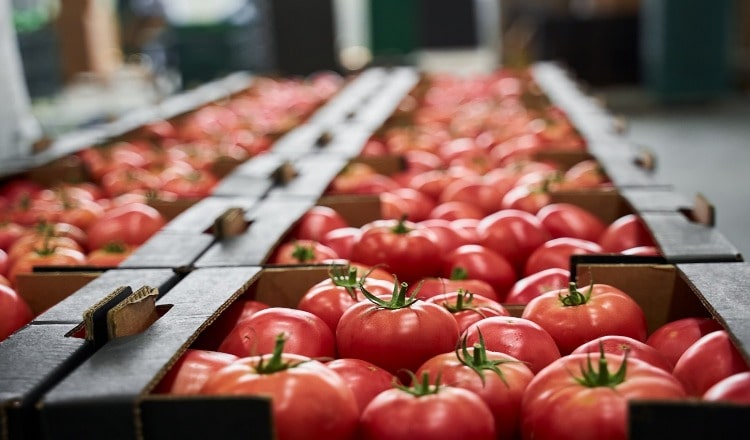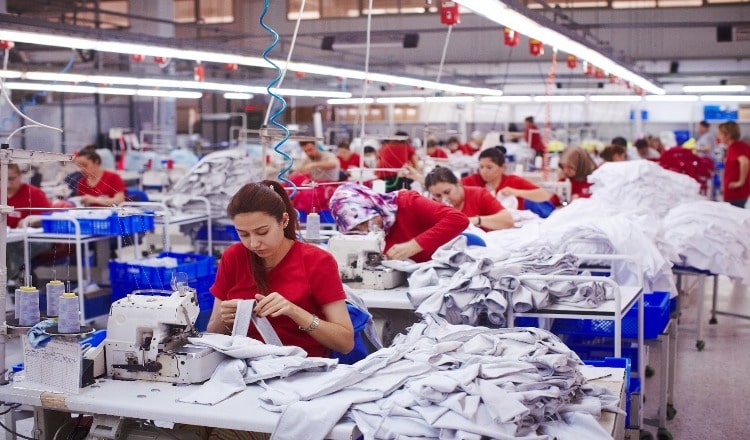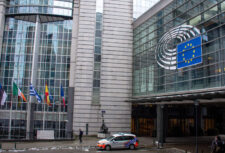21 June 2022
Business and Human Rights Manager, Chloe Cranston, explains the impact of a new US law on Uyghur forced labour in global supply chains.

Today, 21 June 2022, a historic new law will come into effect in the United States, which takes sweeping measures to address corporate profiteering from Uyghur Forced Labour.
This law, called the Uyghur Forced Labor Prevention Act, bans all companies from importing goods tainted with Uyghur forced labour into the USA. As the law comes into effect, Anti-Slavery International and our allies are urging companies to not dump Uyghur forced labour goods into other markets which lack equivalent strong laws, such as the EU and the UK, and for governments around the world to introduce strong import laws to prevent this happening.
In June 2020, Anti-Slavery International and our allies launched the Coalition to End Forced Labour in the Uyghur Region, a coalition now made-up of over 400 rights groups and investors from over 40 countries, united to end state-imposed forced labour in the Uyghur Region. The Coalition launched a call to action to companies, on what steps they must take to end all links with Uyghur forced labour.
The new US Uyghur Forced Labor Prevention Act is a huge win for our campaign. This law, in effect, codifies our demands to companies into law, as every company selling goods on the US market will be legally required to implement actions in line with our demands.
What is the Uyghur Forced Labor Prevention Act?

The Uyghur Forced Labor Prevention Act (UFLPA) establishes a so-called “rebuttable presumption” on products from the Uyghur Region.
This means that US Customs Authorities will work under the assumption that all products produced in the Uyghur Region, or using content (such as raw materials, like cotton, or polysilicon – the product used in solar panels) from the Uyghur Region are made with forced labour.
The only way to ensure supply chains are free of Uyghur forced labour is to cut ties with the Uyghur Region entirely. Due diligence in the Region is impossible because of Chinese authorities’ pervasive and strict surveillance and widespread campaign to silence and intimidate the population. Because of this, the UFLPA’s strict prohibition of any goods made with Uyghur forced labour effectively disallows all imports from the Uyghur Region – unless the importer can prove with clear and convincing evidence that no forced labour was used in any part of the production process.
However, Uyghur forced labour does not only happen in the Uyghur Region. The Chinese government has also forcibly transferred Uyghurs and other Turkic and Muslim-majority peoples to factories in regions across China. The new US law will also ensure US importers cannot be complicit in this, by establishing of list of companies from which importers cannot source under the UFLPA.
A landmark law – but with global loopholes?
We, together with our allies, therefore celebrate the enforcement of the UFLPA. However, now that it comes into force, we watch with caution what happens elsewhere, beyond the USA. There are two key risks.
Firstly, other countries around the world do not currently have comparable laws. This creates the enormous risk that, instead of taking the necessary steps to fully remove Uyghur forced labour from all their products, companies could create bifurcated (split) supply chains, i.e. one “clean” supply chain for the USA, and one “tainted” supply chain for the rest of the world.
Secondly, under the UFLPA, all importers to the USA will actually have the opportunity to re-export products that are blocked from entry into the USA. In effect, this means they can legally turn around their shipment, and send it all the other markets which lack the comparable laws.
Moving forward: demanding a single global standard and stronger laws

In response to these risks, we, together with our allies, are urging all companies in all sectors with US markets to apply the UFLPA standard across their entire global supply chain, and to not create bifurcated supply chains.
We will be calling on companies to demonstrate global leadership, and commit to applying the same standards globally, as they must legally apply in the USA. We and our allies will be monitoring companies closely, to understand which companies may be circumventing the UFLPA, redirecting Uyghur forced labour goods from the USA to other markets, or creating dual supply chains.
Secondly, we will be ramping up our efforts to call for comparable laws around the world, which ban the import of forced labour products. We will particularly be focusing upon the European Union. The EU has already committed to adopt a new law effectively banning products from entering the EU market, and the European Commission’s proposal for the design of this law is expected in September 2022. However, until such a law is implemented, there is risk that the EU, the world’s largest single market, will serve as the world’s largest dumping ground for Uyghur forced labour goods.
This risk is already visible in recent data. Whereas in 2021, direct trade between the U.S. and the Uyghur Region declined by over 60%, the Uyghur Region’s trade with the EU increased by over 13% to USD 1.24 billion. Over half of the Uyghur Region’s direct exports are products made in industries which likely use Uyghur forced labour. Therefore, it is extremely likely that a huge proportion of the EU’s imports from the Region were made with Uyghur forced labour.
Joining forces: what can the public do?
Your support has been vital in our campaign to date, to put pressure on both companies and governments to do more to stop Uyghur forced labour. However, more must still be done.
If you’re based in the UK, please join our campaign calling for stronger laws in the UK to hold businesses to account when they fail to prevent forced labour.
Members of the public should also continue to call on companies to seek assurances that they are taking all meaningful steps to remove Uyghur forced labour from their supply chains.
Please tweet and write to your favourite companies, or support our allies’ campaigns. Every single action is critical for our campaign. Thank you.





